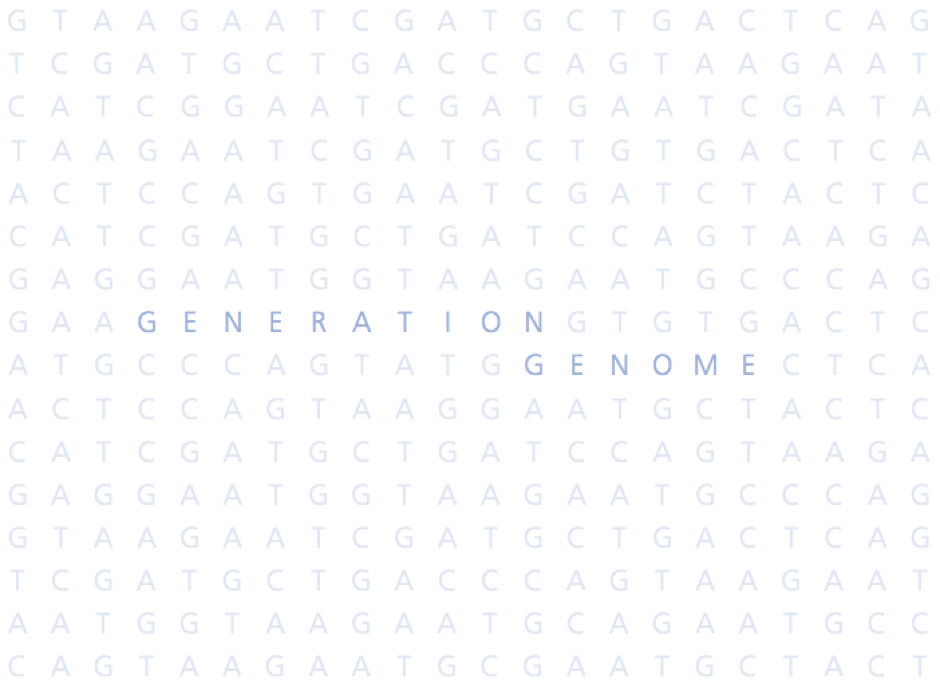Professor Dame Sally Davies, Chief Medical Officer of the NHS, has published her eighth annual report to the UK Government. This year’s report is entitled ‘Generation Genome’ and it report outlines Davies’ recommendations for targeting treatments using genomics, as well as advancing technologies and embedding national standards for using genomic information.

Generation Genome, Professor Dame Sally Davies’s eighth independent report to the UK government as Chief Medical Officer
This report was aimed at professionals who are able to bring about changes in healthcare provision, with recommendations for large organisations such as the Department of Health and NHS. I was eager to read Professor Davies’ report to find out how our everyday healthcare system might look once we start implementing genomics across its many branches. As a frequent user of the NHS (braces, physiotherapy and many allergies to name a few things!), I wanted to know how these recommendations could affect my healthcare in the future. As a researcher, I wanted to know how this change was going to be implemented, ensuring that patients remained at the heart of NHS work.
I picked out three of the sections that I thought would be particularly interesting for EDIT blog readers:
Precision medicine and personalised disease prevention
Precision medicine offers the chance to design treatments based on individual patients’ genetics and allows resources to be directed to those who need them most. In this report, emphasis is placed on the benefits of drug development using genomic data. Drug development has traditionally been a long and expensive process but genomic information can now be used to select drug targets. This can lower the risk of them failing later on in development, as well as decrease harmful side effects.
There is now enough evidence to use genomic information in cancer diagnoses, and technology has developed rapidly to allow identification of areas to target for individual treatment. For example, this month in Nature, an article was published describing the development of a personalised vaccine for cancer. Researchers identified individual mutations in patients with a history of recurring melanoma (skin cancer) and tailored vaccinations which resulted in successful reduction in the number of times the melanoma returned (Sahin et al, 2017). This study provided evidence that this form of treatment was clinically possible – and could offer a reduction in recurrences for many patients, if the methods can be transferred across to different types of cancer.
This all sounds very promising, but in common, complex diseases (such as heart disease and diabetes) there has been less success in identifying important markers for personalised medicine or drug development (Cardon and Harris, 2016). However, some recent studies have demonstrated that research is getting closer to this goal. For example, a new treatment for osteoporosis (a bone disease that results in decrease in bone mass) called Sclerostin is predicted to be the best treatment for patients by 2021 and was discovered through studying two rare genetic disorders – sclerosteosis and van Buchem disease (MacNabb et al, 2016).
The Generation Genome report highlights that genomics doesn’t have a role in personalised disease prevention at the moment. However, early screening may assist in the early detection of diseases which may lead to better treatment results. Common disorders can have very complex causes meaning that it may be much harder to personalise prevention methods for individuals. However, as the field of genomic medicine grows, there may be opportunities for this in the future.
Screening programmes
The NHS already provides screening programmes for some types of cancers which are aimed at particular age or gender groups. Many of these have been successful; in the bowel cancer screening programme, overall uptake was high and 71% of diagnoses were ‘early’. If these trends remain, the programme will have achieved a 16% reduction in the number of bowel cancer deaths (Logan et al, 2011). However, current programmes do not use information about genetic risk of cancer and including this in screening may improve prediction.
Newborn screening is routine in the UK and involves a taking a small sample of blood from the heel, which tests for nine rare conditions that can be treated or prevented early in life. By introducing genomic information into these screens, other conditions may also be identified and could reduce the need for more tests in later childhood. However, there are challenging ethical questions in this case, and there is a recommendation for using this technology for the best interests of the children in all circumstances.
“Genomic data is a form of healthcare data which comes with heavy responsibility for those who are storing and sharing this data”
Make genomic medicine acceptable in today’s society
For me, this was one of the most important sections of the report. How are healthcare authorities going to ensure that ethical reflection and patient engagement are integrated into future developments in genomic medicine? Genomic data is a form of healthcare data which comes with heavy responsibility for those who are storing and sharing this data. There has been public concern and some misunderstanding over the use of personal data and involvement of commercial companies. In a report published by the Wellcome Trust (2016), members of the general public took part in a series of workshops where the topics of discussion included awareness of how health data is used, and attitudes towards consent and permission. Limited understanding of how healthcare data use is regulated was apparent in the responses from participants; genetic data was not known about or understood, and awareness of how the NHS uses personal data was low. Overall, suspicion around data sharing was summarised in the idea that current data sharing practice appears to be ‘shadowy’ and ‘hard to understand’. This highlights a need to address these concerns as a priority when developing new pipelines for data sharing and consent, allowing patients to have confidence in the way their information is handled. In order to achieve this, it is suggested that the NHS provides a set of expectations that the public can have for how their data is used. This would include addressing assumptions that may currently exist as well as clearly outlining how genomic medicine can realistically help in treatments.
Professor Davies’ report is highly ambitious and incredibly exciting for the future of our healthcare. Her recommendations could result in a revolutionised NHS, bringing together much more information and more efficient processes in order to allow better diagnosis and treatment. I enjoyed the emphasis on working together across research and medicine, as well as seeking the engagement of big organisations who are able to help bring about this change. The Genomic Era is now a reality and I look forward to seeing how it can help millions of people across their lifetimes.
References
Cardon, L., & Harris, T. (2016). Precision medicine, genomics and drug discovery. Human Molecular Genetics, 25(R2), R166-R172. http://dx.doi.org/10.1093/hmg/ddw246
Chief Medical Officer. (2017). Retrieved from https://www.gov.uk/government/uploads/system/uploads/attachment_data/file/631043/CMO_annual_report_generation_genome.pdf
Logan, R., Patnick, J., Nickerson, C., Coleman, L., Rutter, M., & von Wagner, C. (2011). Outcomes of the Bowel Cancer Screening Programme (BCSP) in England after the first 1 million tests. Gut, 61(10), 1439-1446. http://dx.doi.org/10.1136/gutjnl-2011-300843
MacNabb, C., Patton, D., & Hayes, J. (2016). Sclerostin Antibody Therapy for the Treatment of Osteoporosis: Clinical Prospects and Challenges. Journal Of Osteoporosis, 2016, 1-22. http://dx.doi.org/10.1155/2016/6217286
Sahin, U., Derhovanessian, E., Miller, M., Kloke, B., Simon, P., & Löwer, M. et al. (2017). Personalized RNA mutanome vaccines mobilize poly-specific therapeutic immunity against cancer. Nature, 547(7662), 222-226. http://dx.doi.org/10.1038/nature23003
The One-Way Mirror: Public attitudes to commercial access to health data. (2017). Retrieved 28 July 2017, from https://www.ipsos-mori.com/Assets/Docs/Publications/ sri-wellcome-trust-commercial-access-to-health-data.pdf


